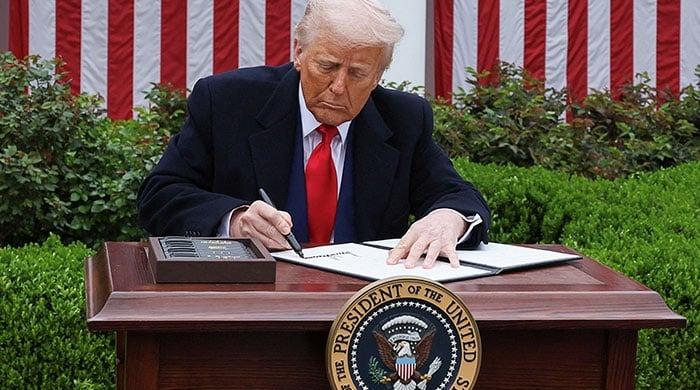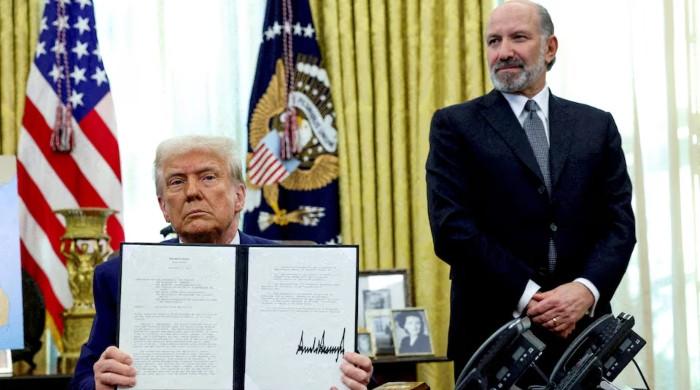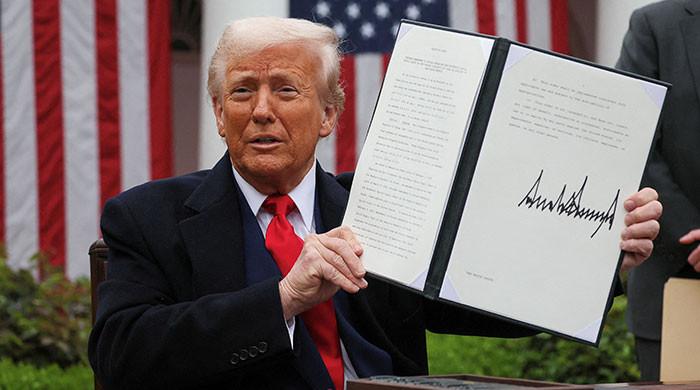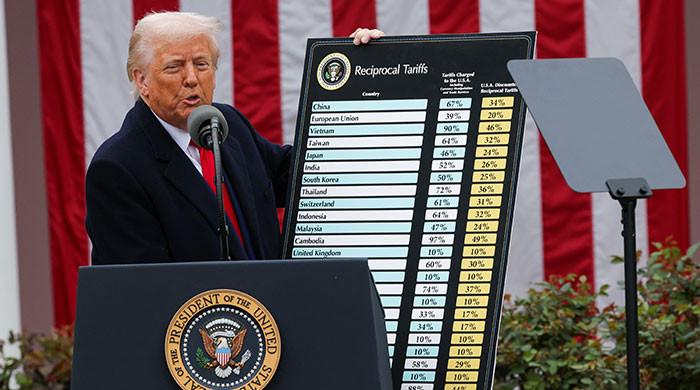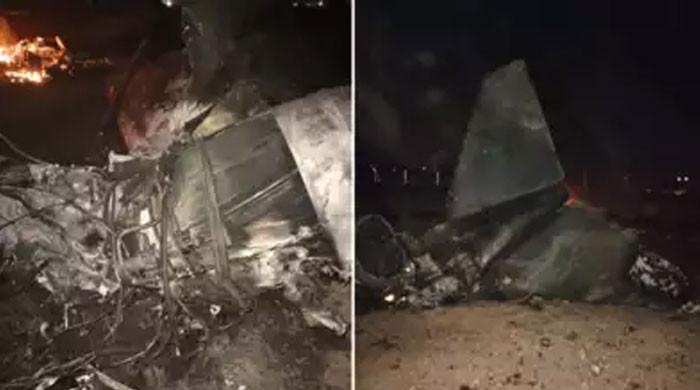‘Respect’ for jury decision to acquit Altaf Hussain, prosecution says
After verdict, Altaf Hussain says "whether it is PEMRA or anyone, they should lift the ban on my speeches”
February 16, 2022
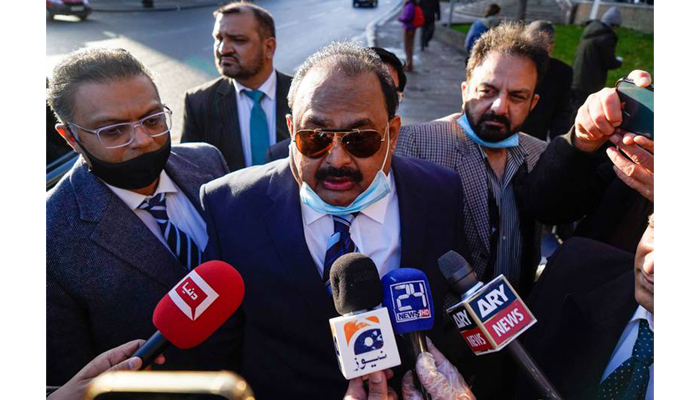
- “The decision to charge Mr Hussain was made after a comprehensive investigation conducted by police as it was a complex investigation," says CPS spokesperson.
- After verdict, Hussain says "whether it is PEMRA or anyone, they should lift ban on my speeches.”
- “This has been a long process for Hussain. Today, he has been vindicated by an English jury. Justice has been done," says Hussain's lawyers.
LONDON: The UK Crown Prosecution Service (CPS) has said it respects the decision of the jury at Kingston Crown Court to acquit the Muttahida Qaumi Movement (MQM) leader of two charges related to encouragement of terrorism.
A spokesperson of the CPS told Geo News after Altaf Hussain’s acquittal on two charges of terrorism that the inquiry into the exiled MQM leader's case was a “complex investigation” conducted both in the UK and Pakistan.
The spokesman said: “The decision to charge Hussain was made after a comprehensive investigation conducted by the police. This was a complex investigation and involved obtaining evidence from another jurisdiction and the assessment of expert witness evidence, before making a final charging decision in accordance with the Code for Crown Prosecutors.”
The spokesman said: “The Crown Prosecution Service's function is not to decide whether a person is guilty of a criminal offence, but to make fair, independent and objective assessments about whether it is appropriate to present charges for a jury to consider, and we respect their decision.”
On Tuesday evening, after two weeks of trial and deliberations of three days, a 12-member jury returned a majority verdict in Crown versus Altaf Hussain, acquitting Hussain on two counts of encouraging terrorism contrary to Section 1(2) of Terrorism Act 2006. Justice May told Hussain that he was a free man after the jury’s decision not to convict him.
The case against Hussain related to two speeches he made on August 22 – first in the morning UK Time and second in the afternoon UK Time – in which he had been alleged by the Crown to have published speeches to crowds “gathered in Karachi, Pakistan, the contents of which were likely to be understood by some or all of the members of the public to whom they were published as a direct or indirect encouragement to them to the commission, preparation or instigation of acts of terrorism and, at the time he published them, intended them to be so encouraged, or was reckless as to whether they would be so encouraged”.
Emotional scenes erupted inside the court as the non-guilty verdict was announced. Around 20 supporters erupted in joy as the verdict was announced. They hugged and kissed Hussain who cried uncontrollably in disbelief and joy.
Outside the court, Altaf Hussain delivered a fiery speech. He told his followers: “The government and the courts of Pakistan should note that this trial had not just judges and prosecution but also jury members who I have never seen in my life. They all heard everything that was submitted as evidence, and the result is before you. Whether it is PEMRA (the electronic media regulator in Pakistan) or anyone, they should lift the ban on my speeches.”
Hussain's lawyers at Corker Binning said: “This has been a long process for Hussain. Today, he has been vindicated by an English jury. Justice has been done.”
During two weeks of trial, the jury was shown hours of video and audio evidence by the prosecution alleging that Altaf Hussain’s two speeches in question amounted to encouraging terrorism from London to Karachi.
The prosecution also presented two witnesses in support of its case: police officer DC Underwood, who had travelled to Karachi to collect evidence as part of the investigation, and expert witness Dr Nichola Khan who presented her report as evidence on the rise of MQM and Altaf Hussain and what followed next.
The prosecution presented as evidence translated transcripts of Altaf’s two speeches and two phone calls made on August 22, 2016 (in the morning and afternoon) to MQM leaders Amir Khan, Farooq Sattar, Rabita Committee members, MQM sector leader and to the MQM followers taking part in the hunger strike camp outside Karachi Press Club.
In the transcript evidence, the CPS told the jury through words and video speeches that Altaf Hussain had told supporters in Karachi to raid the Rangers’ Sindh headquarters and take the then director-general Major General Bilal Akbar out of the building. The transcript evidence also included Altaf Hussain asking MQM workers to go to GEO, ARY and Samaa offices to shut down their transmissions.
As a legal strategy, Hussain’s lawyer decided not to field him as a witness to get him grilled by the prosecutor.
Hussain’s lawyer asked the jury to look at the “Pakistani yardstick” when deciding the case; the CPS asked the jury to consider the “yardstick of England and Wales” and the judge also directed the jury categorically that “yardstick of England and Wales” has to be applied when considering a verdict.
The defence told the jury that there was no doubt that Hussain published statements and he apologised for raising an anti-Pakistan slogan and that there was violence after his speech but that had nothing to do with Hussain, nothing in his control, none of that of his making and that the ground reality of Pakistan is completely different from that in Britain and the life experience of someone in a Karachi hunger strike camp is different to someone living in London.
The expert witness report by Dr Nichola Khan clearly mentioned that the MQM maintained political and charitable wings but also a militant wing. The court also heard that Hussain had spoken of the need for militancy to achieve Muhajir objectives through whatever means possible and that he believed in this to attain a political objective.
The jury also heard that the MQM leader and his followers were victims of the law enforcement and MQM workers were kidnapped, tortured and killed too. The jury also heard that Altaf advocated equality of women, was a liberal democrat in nature and opposed religious militancy openly.
The defence hammered continuously that the prosecution had failed to prove anywhere that Hussain was involved at any stage in encouraging terrorism, and there was no proof Hussain asked MQM workers to go on a rampage, that he asked anyone to attack members of media or public and that those MQM workers who heard Hussain’s speech at the Karachi Press Club were either not present when there was violence outside ARY’s office or they were there but didn’t take part in violence.
The defence told the jury that Hussain’s speech and its exaggerated language should be seen in the Pakistani context where it’s common for political leaders to use such kind of language.
At the end of the trial, the judge directed that in order to convict Altaf Hussain, the jury has to be satisfied that Hussain published a speech, that his speeches were likely to be understood by a reasonable person hearing them as encouraging terrorism and that the MQM leader either intended or was reckless, as to whether members of the public would be encouraged to commit acts of violence after hearing those speeches.
Justice Mrs May also directed that the prosecution does not have to prove that acts of terrorism occurred. The judge directed that when considering the act of terrorism, the jury must consider the type of act, its design and purpose. To convict Hussain, the jury was told they must be certain that the act was done to further a religious, political, ideological or racial cause, regardless of whether the cause was justified or not.
Altaf Hussain’s lawyer Rupert Bowers QC had asked the jury not to convict Hussain because he “did nothing other than that he has always done in trying to represent an oppressed part of a population by organising what is axiomatically a peaceful protest”.
Hussain’s lawyer had concluded: “If violence ensued in the latter part of that day, you’ve seen it, he’s regretful of that. In my submission to you, he’s not a terrorist, and I ask you to acquit.”
In the end, the jury decided, after three years of deliberations, not to convict Altaf Hussain and acquit him of both charges. The jury didn't believe that Hussain had committed acts of terrorism as alleged by the prosecution.





